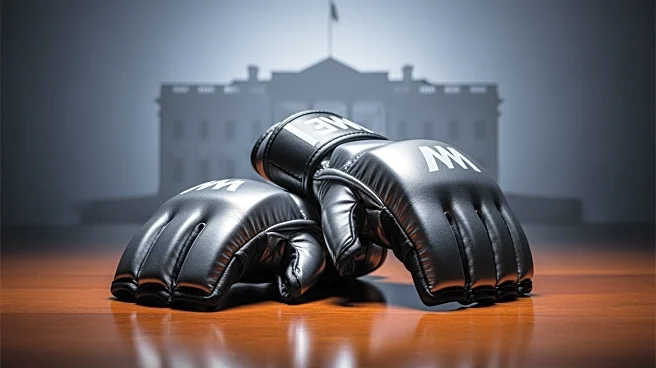What's Happening?
The Ultimate Fighting Championship (UFC) is preparing for a high-profile event at the White House, scheduled for June 2026. This event follows the UFC 306, also known as the UFC Sphere card, which was
held at the Las Vegas Sphere and became the highest-grossing UFC event, generating over $22 million with 16,000 attendees. However, the production costs for the Sphere event exceeded $20 million, significantly higher than the typical $2 million for other UFC events. The upcoming White House event is expected to be even more costly, with UFC CEO Dana White expressing concerns over the budget. The event will be held on the South Lawn, with a simulcast in President's Park, and is expected to have fewer than 5,000 seats, many reserved for foreign dignitaries and VIPs. The costs include an estimated $700,000 for lawn replacement and potentially millions for a dome-like lighting rig.
Why It's Important?
The financial implications of the White House event are significant for the UFC, as it attempts to balance high production costs with potential revenue. The event's exclusivity, with limited seating and high-profile attendees, poses a challenge in recouping expenses through ticket sales alone. This situation highlights the broader issue of managing costs in high-stakes events, especially when aiming to maintain profitability. The UFC's ability to attract top fighters like Conor McGregor and Jon Jones could enhance the event's appeal, but the financial strategy will be crucial in determining its success. The outcome of this event could influence future UFC strategies and their approach to hosting large-scale, high-cost events.
What's Next?
As the UFC continues to plan the White House event, key decisions regarding the fight card and logistical arrangements are expected in the coming months. Dana White has indicated that discussions about the fighters will begin in February. The UFC will need to finalize its budget and marketing strategies to ensure the event's financial viability. Stakeholders, including fighters, sponsors, and fans, will be closely watching the developments, as the event promises to be a landmark occasion in the UFC's history.
Beyond the Headlines
The UFC's decision to host an event at the White House underscores the growing intersection of sports and politics. This event could set a precedent for future collaborations between sports organizations and government institutions, potentially influencing public perception and policy. Additionally, the financial challenges faced by the UFC highlight the broader economic pressures on the sports industry, where balancing spectacle with sustainability is increasingly critical.










